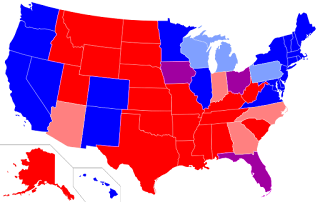Is America Turning Us Into Nervous Nellies?
Let's face it, from Tea Partiers to QAnon to fundamentalist faux-Christians to heavily armed thugs who see nothing wrong with storming their nation's Capitol Building, a lot of our neighbours to the south are not right in the head.
I wonder if Canadians looking at the US in early 1861 had the same sense of unease that has gripped many of us today?
In the Globe, Stephen Marche, author of The Next Civil War: Dispatches from the American Future, wonders if 2022 will be the year the US breaks.
In the old Road Runner cartoons, the Coyote doesn’t immediately fall when he sprints off the edge of a cliff. He can keep going for quite a while with no solid ground beneath him. It’s only when he looks down that he plunges to the bottom. That’s America’s reality today. Its democracy ran off a cliff sometime in the middle of the past decade. And Americans are about to look down.
...For Canadians, the sudden, shocking vulnerability of the United States is unsettling on the deepest conceivable level. We are supposed to be the country that threatens to fall apart, not them.
...The trends leading to this calamity have not been hard to detect: the hyperpartisanship afflicting government, the high levels of vertical and horizontal inequality, environmental degradation, the rapid decline of faith in institutions of all kinds. But the roots of the current American crisis go back to the very beginnings of the United States.
In his farewell address, president George Washington warned of the greatest threat the republic faced, hyperpartisanship.
The nub of the problem, as Marche sees it.
Increasingly, the question facing those who care about the United States is how, not if, the republic will end. There are several possible scenarios. At least one former general has already called for a Myanmar-style coup. Senior figures in government – senators, governors – have started openly discussing secession. Hard-right partisans, the ones who sparked the Jan. 6 attack on the Capitol, have not been quietly ruing the day; they’ve been planning for the next time. Countries require solidarity to survive. Solidarity in the United States has evaporated. The American political system is very dry tinder indeed. One spark is all it will take.
Since the Gilens and Page study we have seen many examples of first legislative, then regulatory, and, now, judicial capture. All three facets of government, that underpin America's vaunted system of checks and balances, are now in service to powerful private interests.
The nation stands divided, perhaps more divided than at any time since the Civil War. The crevices have become a breeding ground for white nationalism, racism, misogyny, and populist xenophobia.
Marche sees a couple of breaking points ahead: the Supreme Court handling of Roe v. Wade and rigged mid-term elections with full-throated gerrymandering and voter suppression.
An American collapse will change Canada’s position in the world and our sense of national identity. It will force a reinvention from the ground up. Once again, Canada will have to respond to the American reality. Once again, we will be in resistance. We already are. Obviously, every political and corporate leader should prepare for American chaos – at the border, in the markets, in international institutions, in the spillover of their toxic political discourse.
Confederation began during the first U.S. Civil War. The next civil war will require as much vision and fortitude on the part of Canadian leaders as the first. The question that faces Canada is not just “What do we do?” It’s “Who will we be?”


"The question that faces Canada is not just “What do we do?” It’s “Who will we be?”"
ReplyDeleteThat's the good-case scenario.
A pessimistic view sees a situation that provides no choices.
Now, NPoV, find us a leader with both the strength and clarity of vision to dare ask that question.
DeleteOur leaders are terrified at the prospect of becoming the one to burst Canada's "carbon bubble." The economic viability of an energy economy based on the world's worst fossil fuels, bitumen and coal, is a political time bomb.
There was an article a couple of weeks ago that listed how heavily each of Canada's chartered banks was invested in Athabasca sludge. At this late stage it doesn't seem like there's an easy way out.
All the signs align. A collapse of investment-grade bitumen undermining the stability of the banks triggering a run on the banks and the failure of private pension funds.
It reminds me of some grainy, B&W newsreel film taken at a US Navy dirigible base in the 30s. The ship had dropped its lines in preparation for mooring. Naval ratings held on to these lines as mobile ballast. A gust of wind came out of nowhere strong enough to pull the dirigible back into the air. Some of the men knew to drop their lines. The others froze and held on as the balloon went ever higher until, inevitably, they dropped off, one by one, to their deaths.
We may have held on to Athabasca's mooring lines too long, leaving the country and its banks in a very precarious position. Instead of cutting our losses and taking an extremely hard but survivable hit we instead try to postpone the day of reckoning, even to the point of building a multi-billion dollar pipeline that no one in the private sector would touch, not even with gold-plated government guarantees.
I suspect they're bluffing for all they're worth, NPoV. In the meantime they'll just keep adding layers of lipstick to that pig.
And a Happy New Year to you and yours.
Just to finish that thought. I think that our federal and provincial governments may have already blocked the emergency exits. We may have lost any ability to decouple from the US, politically or economically.
Delete